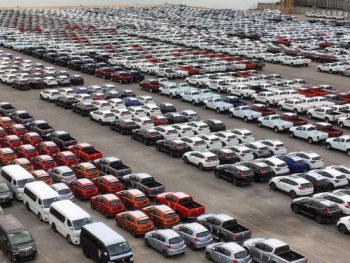UK registrations of new light commercial vehicle registrations fell 20.6% in 2022, hitting a near-decade low as a result of the persistent supply chain issues.

The new SMMT data shows total registrations dropped to 282,139 LCVs, down some 73,000 units on the previous year of strong post-pandemic bounce back.
The fall came despite strong order books throughout 2022, as the persistent supply chain issues resulted in limited model availability.
As a result, the market was 22.9% down on pre-pandemic 2019, marking the fewest LCV registrations since 2013.
Registrations of vans from over 2.5 to up to 3.5 tonnes fell by 14.4%, while vans weighing greater than 2.0 to 2.5 tonnes dropped by 31.0%. Meanwhile, deliveries of pickups fell by 30.4% and 4x4s by 13.6%, with these two segments remaining a fraction of the market.
All eyes are now on a ‘net zero rebuild’ amid rising EV demand ahead of the 2030 ICE ban. A total of 16,744 battery electric vans (BEV) were registered in 2022, up 31.2% and representing 5.9% of all vans joining UK roads last year.
However, uptake remains some way off the new car market, where BEVs comprised 16.6% of new registrations, and the SMMT says action is needed to deliver a van-suitable charging infrastructure and a fiscal framework to encourage more van drivers to make the switch in 2023.
Average new van CO2 emissions also show the need for action; the overall figure rose by 3.9% to 195.7g/km, reflecting a market shift to larger vehicles which offer payload efficiencies. However, many segments of the van market did see their average CO2 emissions fall.
With the second largest van market of all European nations, the SMMT said the UK should be at the forefront of LCV decarbonisation, with BEV van deliveries expected to rise by 60.7% in 2023.
Mike Hawes, SMMT chief executive, commented: “While demand for new vans remained robust throughout 2022, replicating last year’s high levels of fleet renewal was always going to be a challenge with relentless supply chain disruptions and wider economic malaise. A return to growth is expected in 2023, but if this crucial sector is to deliver for the economy, society and the environment, action is needed from all stakeholders, particularly in the areas of charging infrastructure and fiscal frameworks, enabling more van buyers to make the switch.”

